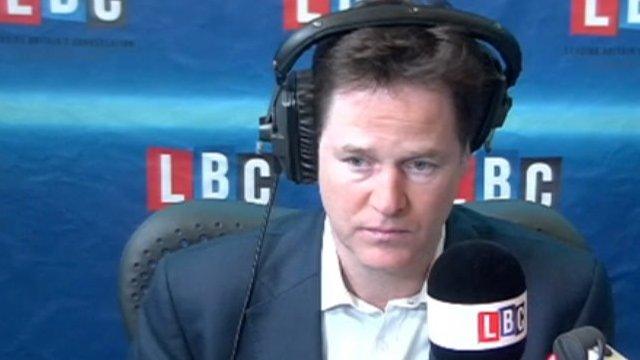Nick Clegg clashes with Nigel Farage in EU debate
- Published
- comments
Mr Clegg and Mr Farage each had one minute to set out their position as the debate began - Courtesy LBC/Global TV
Nick Clegg and Nigel Farage have clashed over who is telling the truth about EU immigration.
The pair were taking part in a live TV and radio debate about whether Britain should stay in the European Union.
Mr Clegg - who wants Britain to stay in - said the UKIP leader's claims about how many Romanians and Bulgarians might come to the UK were "simply not true".
But Mr Farage denied this and said EU immigration was costing Britons jobs and driving down wages.
The exchanges on immigration were the most heated in the hour-long debate, which ranged across issues such as trade, the Human Rights Act, the EU referendum, gay marriage and political integrity.
'Scare' tactics
BBC chief political correspondent Norman Smith said "there was no knockout blow" and both men had given a good account of themselves and their case.
In a YouGov poll of 1,003 voters, some 57% thought that Nigel Farage had performed better in this evening's LBC debate and 36% Nick Clegg.
Mr Clegg - who stared down the TV lens during his opening statement as he did during the 2010 election debates - made jobs the centre of his pitch to the audience.
Mr Farage said Britain needed to regain control of its own laws and borders, saying the European Union was a "failed project" and it was time to leave it.
He also hit out at the EU's role in the Ukraine crisis, saying: "We should hang our head in shame - we have given false hope - the EU does have blood on its hands in the Ukraine."
The issue of immigration sparked a fiery exchange between Mr Clegg and Mr Farage - Courtesy LBC/Global TV
The UKIP leader made a few jokes - but it was an earnest, and at times, impassioned battle of wits between two politicians who, despite being former colleagues as MEPs in Brussels, are diametrically opposed on the European Union.
Mr Farage attacked Mr Clegg for being part of the political elite who had "never had a proper job" but the pair mostly steered clear of personal attacks.
Mr Clegg brandished a UKIP leaflet from the Eastleigh by-election, highlighting its claim that 29 million Romanians and Bulgarians were poised to come to the UK - a claim he said was wrong and a "scare" tactic.
Mr Farage said: "I am not claiming 29 million have the right to come to Britain, I am saying 485 million people have the total, unconditional right to come to this country."
He said the accession of eastern European countries to the EU meant that "for hundreds of thousands of people, working in trades like the building industry, we have had a massive oversupply of labour and you've seen your wages go down over the last 10 years as the cost of living has gone up, and that is not fair on working people in this country."
Mr Clegg hit back, saying immigration was good for the economy - claiming the NHS would "collapse" without foreign workers - and denied the UKIP leader's claims that it was uncontrolled.
"I am not prepared to see anyone lose their job on the altar of Nigel Farage's anti-European dogma," he said.
'Crumbling EU'
On trade, Mr Farage said "people like Nick don't think Britain is good enough" to strike its own deals with countries such as India and China.
The UKIP leader said the UK was now "the eurozone's biggest export market in the world" and would hold "the whip hand" in obtaining good terms in any trade negotiations following exit.
But Mr Clegg said: "It's not the 1950s, we can't turn the clock back.
"We have got new powers on the world stage - Brazil, China, India - and we get more clout by being part of the world's biggest economy."
At the start of the hour-long clash, Mr Farage won the toss (of a pound coin) to decide who made his opening statement first, but said: "I will ask Nick to open the batting."
Mr Clegg said: "Make no mistake - if we cut ourselves off from Europe, from the countries that we trade with more than anyone else, then our hard-won economic recovery will simply be thrown away."
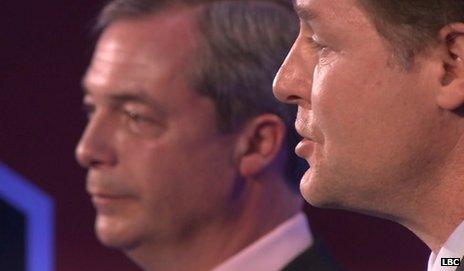
He said he wanted "a Britain that leads in the world by standing tall in our own European backyard, a Britain prepared to work with other countries on the things we can't possibly sort out on our own".
Mr Clegg said: "We are better off in Europe - richer, stronger, safer - and that's why I will fight to keep us in, for the sake of jobs, for the sake of our clout in the world, for the sake of Britain."
But Mr Farage replied: "This debate is between a tired status quo defending a crumbling EU that frankly isn't working any more, and a fresh approach that says let's be friendly with Europe, let's trade with Europe, but let's not be governed by their institutions."
'Real question'
The UKIP leader said that if Britain was voting now on whether to join the EU, it would be presented with the offer "to join a club that will cost £55m a day as a membership fee, and there will be thousands of new laws over which our own Parliament and you the electorate can make no difference, and mean an open border, unconditionally, to 485 million people from across the whole of Europe - many of them from very poor countries - who can come here to work and live and settle and bring their families".
He said that the UK would also be told it would have to cut links with the Commonwealth and other English-speaking countries as a result of joining the club.
And he told the audience: "I know the result of that referendum: You wouldn't join it."
Anna Soubry: "The real question is who can deliver what I think the British public want and what they want is the opportunity to have a referendum. "
The first EU debate was hosted by radio station LBC. On 2 April, round two will be televised live at the same time on BBC Two.
Prime Minister David Cameron, who has promised an in-out referendum if the Conservatives win the next election, and Labour leader Ed Miliband, who says he will only sanction a referendum if further powers are handed to Brussels, have opted not to take part in the debates.
Conservative minister Anna Soubry said Mr Cameron's decision not to take part was "not really of any relevance at all" and "the real question" was who could deliver a referendum.
Jonathan Ashworth, Labour shadow minister: "Is it the big issue on people's minds? I don't know"
Labour's shadow Cabinet Office minister Jon Ashworth said it had been an "amusing" debate but did not mean much to ordinary voters worried about the cost of living.
For the Scottish National Party, MSP Aileen McLeod said: "Scotland's always been much more pro-European than other parts of the UK
"Our interests are best served by being part and parcel of the EU."
Plaid Cymru's Leanne Wood said: "There are one in 10 jobs in Wales reliant on our membership. Civic society in Wales is united in wanting Wales to remain as a member of the EU.
"So the debate that took place tonight was one that wasn't really focusing on Wales's interests, and Wales's part in this debate."
- Published26 March 2014
- Published26 March 2014
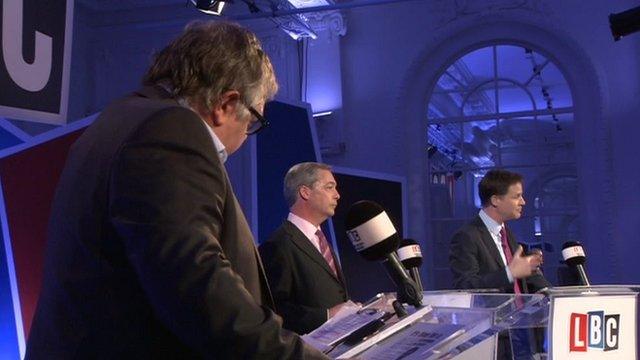
- Published26 March 2014
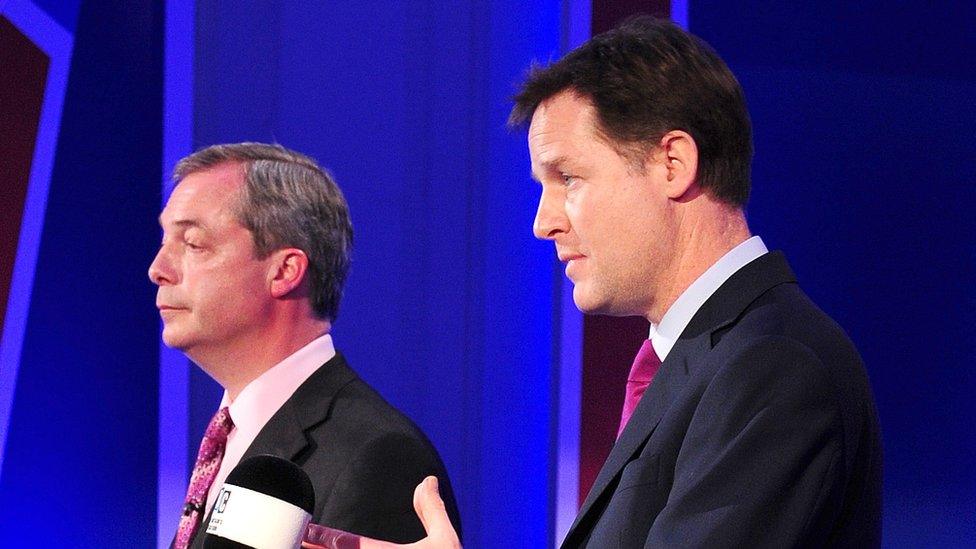
- Published26 March 2014
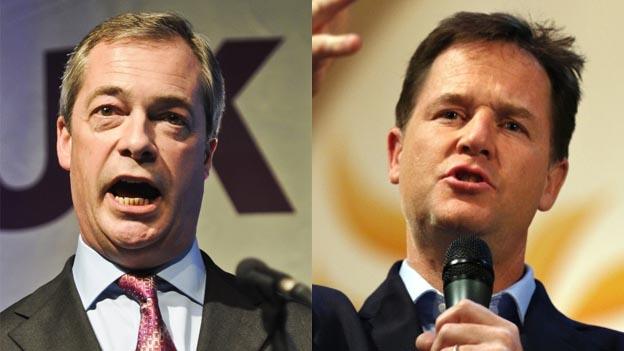
- Published5 March 2014
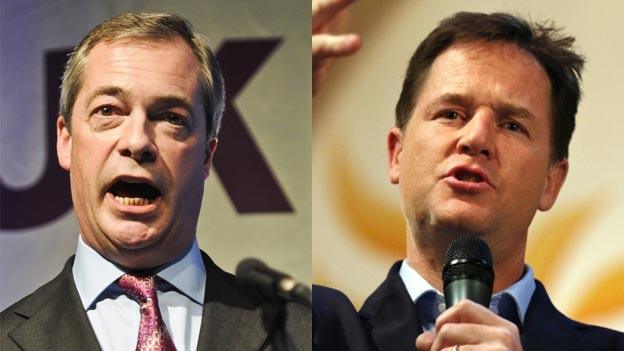
- Published23 February 2014
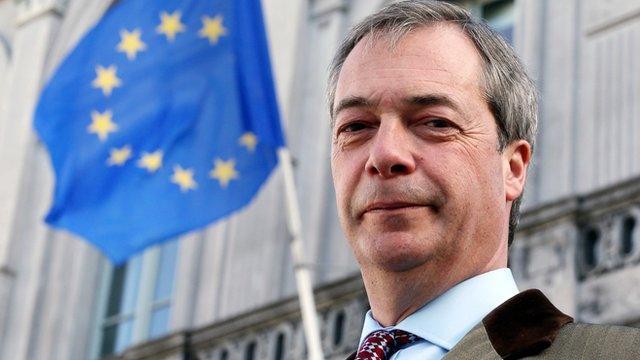
- Published20 February 2014
